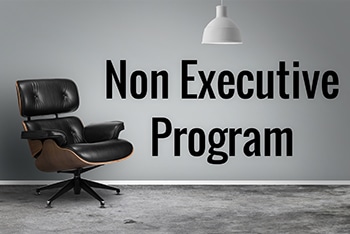A recent study I conducted found 65% of current board members found their most recent board appointment via a personal connection! So how do you utilise your ‘personal connections’ to gain a board appointment?
Networking’ conjures up images of cocktail parties and business cards – and while this has its place it is not for everyone. Developing ‘personal connections’ on the other hand – not networking – is the thing that will get you appointed. For most this notion makes sense but how do you develop these connections and with whom?
Most people when posed with the knowledge of the importance of developing personal connections immediately think of approaching and speaking with the experienced Non Executive Directors that they already know, are known by and trust (they are called your ‘strong ties’). This makes some sense.
However, and counter intuitively, these ‘strong tie’ connections are actually statistically the leasteffective people to speak with and rarely drive a board appointment – although there are a few specific exceptions.
In reality it is your ‘weak ties’ – those who you speak to rarely or infrequently that are most likely to result in a board appointment.
My Research
My recent study found that Board members are appointed in four ways:
- 65% of people are appointed to a board through their personal connections
- 15% are appointed directly
- 10% via recruiters
- 10% via advertisements
In this article, I want to focus on the top 65% – the way you can employ your personal connections to gain a board appointment.
Why Personal Connections and not Networking?
You may notice that I don’t often use the terms networks or networking. There is a specific reason for this; the term networking conjures up antiquated images of cocktail parties and business cards.
Indeed, these can be useful but what I want to focus on are the macro elements needed to develop and foster meaningful relationships that result in board (and sometimes executive) opportunities.
I also want to steer you away from generating contacts for the sake of contacts. Instead, I want to show you how to develop personal connections in simple and (relatively) stress-free ways.
Strong Ties and Weak Ties
You first need to understand that personal connections can be split into two sub-groups. These two sub-groups are defined as Strong Ties and Weak Ties.
- Weak Ties are Contacts and Connectors. Contacts are people you see rarely or infrequently. Connectors are people that you want to know because you know that they can provide access to people or opportunities that you need to further your board opportunities.
- Strong Ties are Friendships and Relationships. These are people you know well and who know you well. They are probably people you work with, family, close friends or colleagues that you see on a regular basis. They are also probably the people you first think about when wanting to find connections who can help you develop a board career.
Weak Ties: Contacts and Connectors
However, according to Malcolm Gladwell, and counter intuitively, it is the Weak Ties that make you powerful. He points to sociologist Mark Granovetter, whose classic study, Getting a Job, surveyed 282 Boston workers and found that 56% got jobs through a personal connection. However, of those connections, he found that most were weak ties. Only 17% of people who got a job through a personal connection saw that contact often. 55% saw them occasionally and 28% saw them rarely.
That means that 83% of people saw the person who got them a job rarely or infrequently. He found that people were nearly three times as likely to have found their job through a personal contact than through an advertisement, headhunter or other formal means. In other words, success is largely about who you know, not what you know.
Extrapolating these findings to board appointments, it means that approximately 53% of all board appointments occurred through connections seen rarely or infrequently – an amazing statistic and one that should revoluntionise the way you search for a board appointment.
Why do Weak Ties make you powerful?
Weak ties make you powerful because over 50% of all board appointments occur through these contacts.
Contacts, to begin with, might be people you know but have lost touch with. They might also be people you know the name of but not much else. They will certainly be people that have changing circumstances that you are not aware of and they will likely have the same level of awareness of you.
Reconnecting with them might seem awkward or in some cases insincere, primarily because you probably should have stayed in contact in the first place. In other cases, it will simply be distance that keep you apart or they are people you see at an annual conference, sporting engagement or when you meet certain friends.
When connecting with this group, you need to try to develop a relationship – not just pump them for information about an opportunity. Perhaps the best way to do this is to connect with them through an existing common relationship.
Failing that, doing a little research and sending them an article that might interest them or making an introduction, is a great way to renew a relationship.
The great thing about renewing an old relationship or just a fledgling one, is that it is a chance for you to reframe yourself. That is, to change an outdated perception of what it is you do and want. (Your board profile or elevator pitch can come in handy here.)
That is why these contacts are so valuable. They won’t know you well enough to risk a relationship, should things not work out. You also get to impress upon them your professionalism and experience and they come with no preconceptions of unprofessionalism or prejudice.
This group is a blank slate for you to write your board aspirations on. Should you utilise your existing board profile correctly, then they will likely think of you then, and in future, as a potential board member. They will also be the group of people most likely to be able to help you achieve your board aspirations because they will be willing to help the most.
Even more powerful than your contacts are the connectors – they are the ultimate weak tie. They are people that you want to know, as they will have direct links to the organisations you want to sit on the board of.
You are likely to have found them through your research. They will also be the people whose names keep coming up in conversation around a certain topic. They may also be the people most active on social media or in the media.
It takes time but connecting to these people in a meaningful way (often via social media) is a great way to do this.
On countless occasions, I have heard stories of a chance meeting at a dinner or a meeting at a Saturday morning sporting event leading to board appointments. Just a few months ago, a client recounted a story to me how they were appointed to a financial board after going on a sailing trip with his daughter’s friend’s father at a school event. They happened to sit next to each other and got talking about what each other did; through the conversation he was offered a position on the board – just that easy!
Weak ties are so effective because you get to (re)define yourself as a professional and a NED. You can do this because they don’t know you and there is likely no relationship to jeopardise. If you do it right, then they will also respect you.
Weak Ties are also powerful because they will know people you don’t and conversely know of opportunities you don’t. They also understand that this new relationship can be used for business and the good ones will know that they build credibility through these weak tie networks.
What role does ‘Old School Ties’ play?
I have spoken about the risk adverse nature of board appointments and the positive impact of an individual who comes recommended via a trusted colleague. This recommendation can sometimes come from an Old School Tie. As such, I am not as critical of people getting appointed via this means as others might be.
When looking at the board appointments process critically – whether it be for a not-for-profit organisation, government body or private commercial company – and in comparison to an executive appointment, you are likely to see many similarities as personal recommendations are often used to fill executive roles.
If you were to be honest, you have probably been guilty of introducing people that you know for executive roles in the past too – and would do so again. I certainly would. For this reason, old school ties can be incredibly valuable for some to get on to a board – though for the majority of us they are not as valuable as you might think they would be and you won’t miss out on many opportunities if you don’t have them.
However, if you do have the opportunity to reconnect with, or slot yourself into, a group or organisation that might be considered an old school tie, then you definitely should.
Strong Ties: Friendships and Relationships
Why are strong ties not as useful as you might have initially thought them to be? As I said earlier, this group can be split into friendships and relationships.
Friendships are people that you know from and within a social setting. In many cases they will be long held relationships. In all cases, though, these relationships will have been developed (though perhaps not instigated) outside of a professional setting.
The reason that friendships don’t result in board opportunities to the same extent as weak ties do, are numerous.
For a start, you are likely, in the mind of a friend, unproven as a board director. As such, your friends will likely be unwilling to risk their relationship with you, should a board introduction not work out. Further, friends might be uncertain of your ability – after all they don’t know you in a professional setting. They might also consider you unprofessional, as they know you too well and for too long and in settings that are by nature unprofessional. Finally, while they like you and want to maintain a friendship, they also might not respect you.
Although these reasons might sound cruel, pause here for a minute. I am sure you have of lots of close friends that you love dearly but would never recommend for a job either, because your reputation might suffer or you just don’t think they could do the role.
Relationships are similar to friendships but are not friendships. They are often based on mutual respect; often professionally driven and will have begun in a professional setting, so they may be a colleague or a professional stakeholder you work closely with.
While you may be close with these people, when you again look critically at the relationship, both parties would likely understand that they are there for business. As such, the relationship is built on the credibility gained through each other’s networks and professionalism.
At first glance this sort of relationship might sound like a good recipe for getting ahead but in many cases the same barriers might exist in this set of relationships as those for friendships. For example, you might not know if they truly respect you enough to risk their reputation in an area that they have not seen you perform in or whether they genuinely like you.
Strong ties do count but you need to know how to use them.
Strong Ties: Test Them, Direct Them
You need to understand that friendships give us access, not business. While relationships can give us both business and access, both groups need to be tested to work out which one works for you.
Essentially, what you need to find out, is if they are willing, and able, to help you in your journey towards a board appointment in ways that will not jeopardise the tie you have, whether business or personal relationship.
The key here is to never put these relationships on the spot by asking for a job. After all, refusal to help often offends and can lead to a downward spiral of why questions that will only result in tears.
Instead, begin by asking if they are willing to help. If they are, then remind yourself that they will still be unlikely to put you in direct contact with people who have opportunities. Instead, you need to expect to access the people who they know that in turn might be able to help.
Simply asking something like ‘Do you know anyone who I could speak with that might be able to help?’ is a good start.
Saying that they do is a positive step. But remember that they are unlikely to want to offend you, so the true litmus test in this scenario, is if they do actually introduce you.
If they say they can help but don’t, then it is likely that there is a reputational element that is preventing the introduction being made. Likewise, if they say they can’t help or can’t think of any introductions, then again there is an issue. Should this be the case, then you must move on quickly. Don’t pause to consider the why not questions; instead consider the relationship tested and a result found.
If they do make an introduction, then it is paramount that you utilise it.
Board Direction can GUARANTEE you a board appointment. How do we do this? Click here to find out more
The Non-Executive Program (”The Journey‘) – was developed exclusively for those serious about fast-tracking a Non-Executive Directorship. It differs from our other packages (ACCESS, ACCESS+, EXECUTIVE) in both content and accountability resulting in GUARANTEED APPOINTMENT for participants. Core to the Journey’s success is having EXCLUSIVE access to David Schwarz – Australia’s leading board recruitment expert – who will not only drive your success but provide all the support, connections, documents and training you need to gain a board appointment regardless of whether it is your first or a subsequent appointment.
Clich here to see what the non-executive director program has to offer
About the Author
David Schwarz is CEO & Founder of Board Direction – Australia’s leading board advertising and non-executive career support firm. He has over a decade of experience of putting people on boards as an international headhunter and a non-executive recruiter and has interviewed over one thousand non-executives and placed hundreds into some of the most significant public, private and NFP roles in the world. He has been described as Australia’s leading board recruitment expert, is a published author, a regular speaker on the board appointment process and runs Board Search Masterclasses across Australia. He is one of Australia’s Top 10 LinkedIn users with over 28,000 connections. Email: ua.mo1714114810c.noi1714114810tceri1714114810ddrao1714114810b@tca1714114810tnoC1714114810






